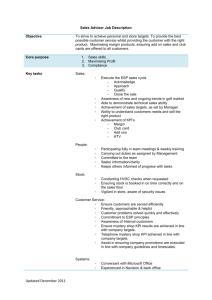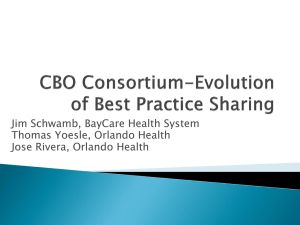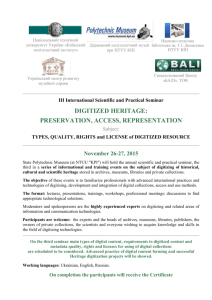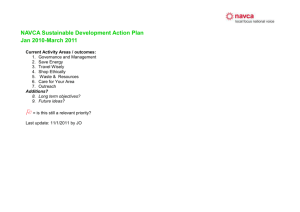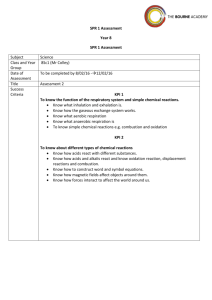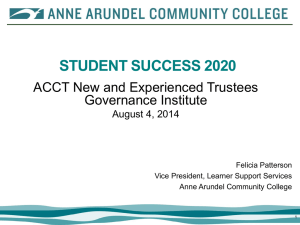the Operating Plan
advertisement
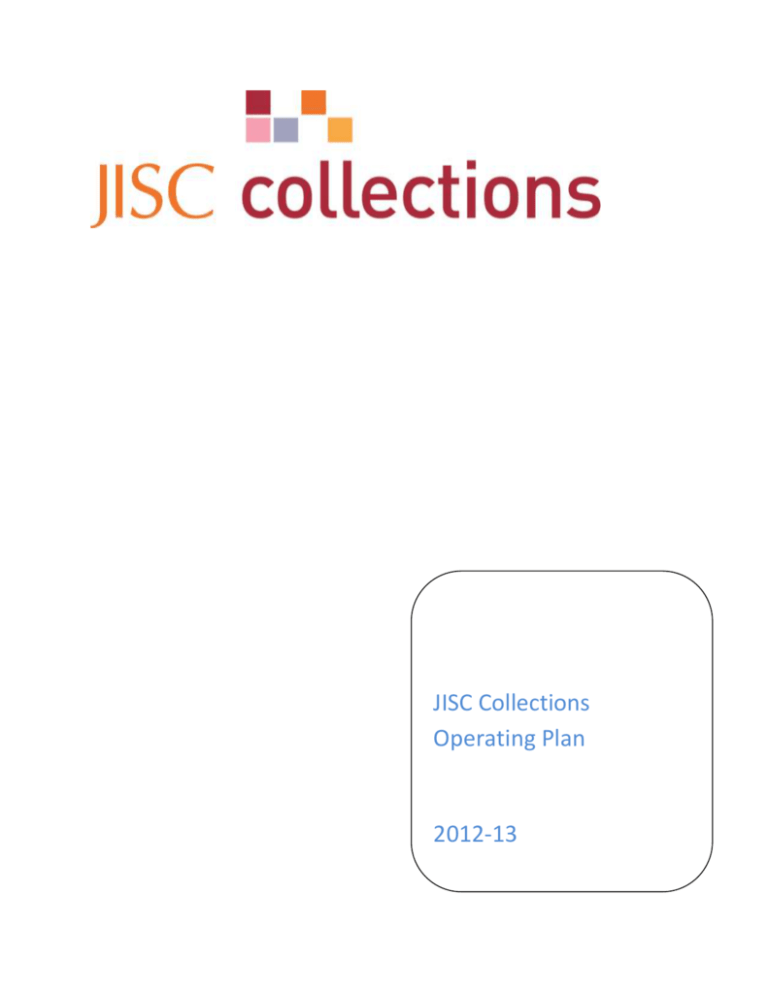
JISC Collections Operating Plan 2012-13 JISC Collections Operating Plan 2012-13 2012-13 is a year of exciting transition for JISC and its services. We will: Collaborate constructively with colleagues in JISC and the JISC Services in the Transition of JISC. Ensure that the services and projects we provide and undertake, align to and support, the new JISC Strategy. For 2012-13, JISC Collections will implement a balanced scorecard to help evaluate and manage our operational effectiveness. A balanced set of objectives and measures will enable the executive directors and leadership team to review operational performance from four perspectives: Customer Financial Internal Business Innovation and development Although a balanced scorecard can be presented visually in a number of ways and can be tailored to specific requirements, a typical example might look like this: Finance Our customers Vision and Strategy Innovation and development Internal business 1. Our customers The feedback we receive from our members in our annual satisfaction surveys helps inform our core service and priorities and provides a check that our strategy is the right one. Based on the feedback from the 2012 survey results we will, for the period August 2012 to July 2013: 1.1 Negotiate the best financial terms possible on all renewal agreements KPI: All renewal agreement annual price increases to fall in the band of 0-3% 1.2 Devote time and effort to identifying new, value-added heritage collection opportunities for our customers, and protecting and enhancing the collections already purchased KPI: Ensure newly licensed collections are available in JISC eCollections KPI: Ensure a fully auditable, evidence-based appraisal of community interest in a collection prior to negotiations 1.3 Seek compliance with our model licence KPI:70% of licences with 95% compliance 1.4 Conclude and announce agreements in a timely manner KPI: 90% of renewals to be announced not less than 1 month prior to the expiry date of the existing agreement 1.5 Make licence agreements available at the same time as the commercial offer documentation KPI: 85% of licences to be made available within two weeks of the offer being made available on the JISC Collections website 1.6 Continue to improve our communication with our members KPI: 100% of monthly renewal reports for NESLi2 and JISC Collections agreements to be made available to members by 1st working day of month following month of reporting KPI: At least 5 regional roadshows held in May-June 2013 for HE institutions KPI: At least 2 webinars for FE community to cover topics of relevance KPI: Minimum of 20 meetings with Library Directors undertaken by CEO/Deputy CEO KPI: Ensure that our conference and AGM programme appeals to all our stakeholders and reflects our current portfolio of services 1.7 Provide excellent help desk support to our members following the announcement of offers and agreements and in response to UKAMF queries KPI: All queries acknowledged within 2 hours and a response provided within 24 hours of receipt KPI (UKAMF): Full compliance with our SLA for service delivery 1.8 Expand our portfolio to include community-requested legal resources and packages of ebooks KPI: To be engaged in a dialogue with one legal publisher by September 2012 KPI: To undertake two pilots during 2012-13 to test consortia models for ebooks acquisition KPI: To include ebook offers in relevant NESLi2 re-negotiated journal agreements, where commercial terms and administrative efficiencies make them advantageous to our members 1.9 Introduce and communicate to our HE members a publisher- and library-endorsed decision making tool comprising a check list and registry of Partner Information for institutions concerned about students who may not be Authorised Users; and Negotiate with publishers extra FTE fees for students of partner institutions KPI: To provide our members with a decision making tool to help identify which students are covered by existing licence agreements and which are not by September 2012 KPI: Train our helpdesk in the use the decision making tool so that they can better assist with queries regarding Authorised Users and Partner Organisations by September 2012 KPI: Implement a web-delivered registry of institution partnerships and to have 50% of HE institutions having provided their data to JISC Collections for the Registry of Partner Information by July 2013 KPI: To ask all publishers with whom renewals are due to additionally provide FTE prices for additional users in partner organisations and to have agreed such a list and included it as an annex in at least 50% of our renewal licence agreements by July 2013 2. Internal business: 2.1 We will continue to develop our staff and their skills by providing an environment that encourages initiative: By providing the appropriate opportunities for staff to engage with each other, share ideas and experiences and learn new skills By committing to our performance review process and acting upon the training and development needs expressed by staff KPI: To undertake a staff satisfaction survey by December 2012 to gather feedback on the level of opportunities offered for development and learning new skills 2.2 We will continue to look at ways of using ICT as a tool for improving performance and efficiency throughout the organisation KPI: To implement and test a collaborative, cloud-based collaboration platform during 2012-13 2.3 We will continue to review the internal structure and work flows of our licensing and helpdesk service provision to ensure that we are as efficient and as effective as possible within a reducing budget, including: Review our internal team structures Allocate tasks to make our service as streamlined as possible Review our workflows to ensure that we deliver high quality service in a timely way KPI: Quarterly review of licensing and helpdesk provision, structure and workflows undertaken by CEO, Deputy CEO and Head of Licensing 2.4 We will continue to deliver the following funded projects: A core collection of e-books to support students at further education colleges in their studies KPI: Improvement of 2% in satisfaction rating from respondents to the 2012-13 Satisfaction Survey in relation to this service Exploration into how e-books and other e-resources might be made available to learners in work-based learning, adult community learning and offender learning through a pilot. KPI: Completion of the pilot and recommendations regarding next possible next steps. Exploration into how JISC Collections might be able to provide further education, work-based learning, adult community and offender learners with interactive games to support learning Deliverable: Two/three games licensed and available to order from the JISC Collections website by January 2013 Collaborating with stakeholders to undertake a pilot and research programme to gather critical data to inform the development of open access monograph publishing in the humanities and social sciences. Deliverable: Reporting to the Project Steering Group on the pilot and research programme and sharing knowledge and findings with the community. 3. Innovation and Development: 3.1 We will continue to invest in, and improve, the functionality of our transactional website led by customer and staff input KPI: Simple process available for staff and customers to suggest improvements allied to robust and audited analysis of the business case and costs for making the changes 3.2 We will continue to ensure that sufficient priority is given to our work with the Advisory Boards to improve, enhance and develop the JISC eCollections service in accordance with user behaviour and needs, the changing scholarly environment, and innovations in technology and learning KPI: Increase satisfaction of the overall JISC eCollections service to 50% in both HE and FE KPI: 20% improvement in satisfaction for JISC Historic Books platform by February 2013 The table below shows satisfaction levels with the respective platforms as at February 2012 Service / Platform JISC eCollections JISC Historic Books JISC Journal Archives JISC MediaHub February 2012 Satisfaction HE (those that answered very satisfied and somewhat satisfied combined) 35% 18% 44% 40% February 2012 Satisfaction FE (those that answered very satisfied and somewhat satisfied combined) 41% 17% 17% 47% 3.3 Within the framework of the UKAMF Policy Board, we will explore how to improve the user experience when accessing resources using federated access KPI: Outreach of the Guidance (EXPRESSO guidelines etc) to publishers and institutions, via workshops, presentations and papers at establish conferences . KPI: Technical Improvements (the new Federation WAYF), launch of WUGEN as a service and use of MDUI logo info. 3.4 We will continue to input into the development of JUSP as a tool for supporting consortium negotiations KPI: New reporting and analytical tools available to JISC Collections in 2012-13 to make the process of evaluating publisher offers more scientific and transparent and to help as part of negotiation strategy 3.5 We will continue to deliver more journal publishers into JUSP as part of our contribution to the ongoing sustainability of this service KPI: 20 new publishers delivered into the portal during 2012-13 3.6 We will build on KB+ to provide institutions (and their vendors of choice) reliable e-resource information to ensure the effective management of online content, the saving of duplicated time across institutions KPI: To provide accurate publication information for NESLi2, SHEDL and WHEEL 2013 agreements by 1st January 2013. 3.7 We will test with our community the effectiveness of the Electronic Licensing Comparison Tool (Elcat), and commit to further investment and development subject to positive feedback KPI: Evaluation of the pilot access period to be undertaken by December 2012 4. Financial 4.1: We will create and communicate to our staff a budget for the 2012-13 Financial Year that enables us to meet our various operational objectives and commit to working within it KPI: Comprehensive and accurate budget with supporting commentary delivered by deadline date. Regular reports on activity against budget monthly to SMT and for each Board meeting 4.2: We will continue to ensure that all staff remain aware of the importance of operational efficiency in all that we do KPI: Quarterly staff meetings will continue to address operational and efficiency matters as standing agenda items 4.3 We will work with colleagues as part of the JISC transition on any matters pertaining to finance and financial integration KPI: Priority given to ‘transition-related’ requests for information from within JISC during this time and agreement to meet requests for information by the given deadline date wherever possible. 4.4 We will work with all the internal and external stakeholders involved in ensuring that JISC Collections complies with current financial legislation KPI: Submit financial data by agreed delivery dates to auditors, bankers, HMRC and other external stakeholders, as well as internal parties (JISC, JISC Collections Board, SMT) 4.5: We will work with our customers to ensure that monies owed to JISC Collections for negotiated agreements are efficiently collected and delivered to publishers and content providers in a timely fashion and by any stipulated dates KPI: Maintenance of debt collecting regime and reporting by way of the approved spreadsheet template and monthly scrutiny of aged debtor reports


